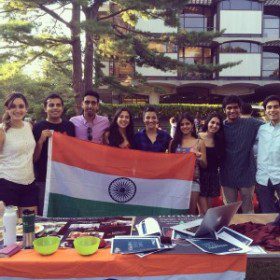 “We want a better India,” reads the slogan for the Harvard US-India Initiative’s (HUII) Annual Conference in New Delhi on January 9 and 10, 2015.
“We want a better India,” reads the slogan for the Harvard US-India Initiative’s (HUII) Annual Conference in New Delhi on January 9 and 10, 2015.
HUII is an undergraduate student-run organization at Harvard that aims to create dialogue between Indian and American youth to address some of India’s most pressing social, economic, and environmental issues today.
The conference, which is cosponsored by SAI, is set to take place at the Shangri La Hotel, and is the largest yet for the organization. It boasts an impressive lineup of speakers and panel topics, including ‘Liberal Arts and Conservative Societies,’ ‘Politicians and the People,’ ‘More Artists or More Dentists,’ ‘Human Rights in India,’ ‘The Economics of Rural India,’ and ‘Science and Society.’
Keynote speakers include Piyush Goyal, Hon’ble Minister of State with Independent Charge for Power, Coal and New & Renewable Energy in the Government of India, Mirai Chatterjee, Director of Social Security, SEWA, and Shri Jairam Ramesh, MP Rajya Sabha, former Cabinet Minister.
SAI recently talked to Namrata Narain, Harvard College ’15, one of the organizers of the event, to learn more about how HUII is working to increase discussions on important issues by connecting young academic communities in India and the US.
 SAI: The slogan for the conference is “We want a better India.” Can you expand on the meaning of that, and the general goals of the conference?
SAI: The slogan for the conference is “We want a better India.” Can you expand on the meaning of that, and the general goals of the conference?
Namrata Narain: In the past couple of years, India has seen a huge change in its fortune. Two or three years back, the Indian economy was downgraded to an almost “junk” status by multiple financial agencies across the world. But after the elections in early last year, things started looking better; a new government came into power which promised development and an economic agenda to free the country from its socialist hangover.
All of us Indian international students at Harvard sat down and were talking about this change in India, and we thought that the time was right to talk about how we, as students, could participate in this larger trend of people moving forward, not just economically but ideologically. I think we are at a wonderful position now to contribute to this discussion on how India can be made better.
For the last couple of years, the larger narrative was focused on what was wrong with India, and I think in this conference, we are going to focus more on how we can make those wrongs right.
SAI: That’s great that you have a positive approach to the issues rather than negative.
NN: Exactly, because that generally does reflect the spirit of India right now. There is much more optimism, and the current government has an approval rating of 70%, which is unprecedented. There is a general feeling of happiness and optimism in the country.
[Based on the interest in the conference] there is a general belief that everyone can do something to improve India, which is very different from my parents’ generation, who thought individual efforts would go unnoticed. That is what we are going to embody in the conference – how we can individually contribute, one step at a time.
We are incredibly excited to interact with the speakers. We have made sure that each speaker has an incredible reputation in their field. We have journalists who are known throughout the country for being fair and un-biased and are extremely popular. We have professors from the best universities coming. We have the biggest names in the government.
We have all these incredible people who are where they are because they are extremely smart, and I think interacting with them and with each other will help us get a wider idea about what people are thinking about these problems.
SAI: What do you see as some of the challenges facing higher education in India, and what do you think the US and India could learn from each other?
NN: I think the Indian education system is interesting in how it sees the people who come first. For the students who are at the top of their high school or of their state, there are incredible opportunities and wonderful universities who produce all the leaders this country has. But, for people not in the top 5%, the education system is absolutely abysmal, and abysmal to the point that a lot of my very good friends go to universities where no one feels they need to work hard towards education. I’m unsure of why that is, which is why we have so many questions in the panel [on education at the conference].
One thing, in my opinion, that the best universities in the West can teach Indian universities is this value of academic honesty. At Harvard, I found it extremely difficult to come to terms with how absolutely honest I had to be in my work; this was a very new concept for someone who came from an education system that did not care or value original thought. I think the Indian system stands to gain a lot from honest academic research work that initiates original thought.
SAI: Can you talk a little about HUII’s mission, and what the group aims to do in the future?
NN: HUII is a very young organization. It was started 4 years ago when the founders realized we had so many great cultural organizations on campus, but none that catered to discussing concrete political, economic, or social problems in India. HUII tried to fill this gap by hosting conferences in India and the US. This conference is the first of this scale, and is aimed at making HUII a larger organization and defining its focus.
Most of us [in HUII] are students from India who are studying at Harvard. HUII is one way for us to keep in touch with what is happening in India. I think it’s very easy for international students to lose touch with the problems in their country. I, for the longest time, was more aware of what was happening with US politics rather than knowing full well what was happening with the elections in India.
HUII is one catalyst to bring forward these discussions and what is happening back in the homeland, which is an incredible resource. Moving forward, we will continue conducting such conferences and focusing on concrete policy-making initiatives and the concrete desire to create change and give back.
This interview has been edited lightly for clarity and length.
Learn more about the HUII conference.
Learn more about HUII’s ’emBODYIndia’ campaign.
-Meghan Smith
